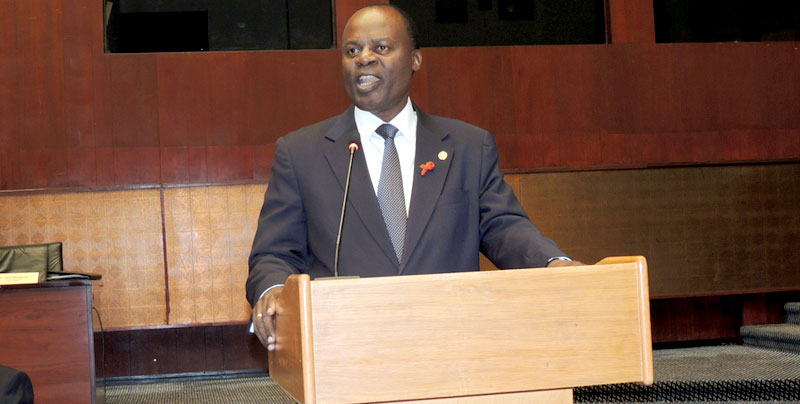Business
Kasekende advises insurerers to merge
Bank of Uganda Deputy Governor Dr. Louis Kasekende has called on insurers to consolidate their operations as a way to increase their competitiveness and play a more meaningful role in the economy.
Dr. Kasekende said that the insurance industry is too fragmented at the moment, with most of the small players operating in red.
Dr. Kasekende made the remarks while officiating at the first graduation ceremony of the Insurance Institute of Uganda (IIU) held at the Golf Course Hotel in Kampala, last weekend. Below are excerpts of his speech.
Let me begin by thanking the Chief Executive Officer of the Insurance Institute of Uganda, Mr. Saul Sseremba, for kindly inviting me to be guest of honour at this dinner. I would like to commend the institute for all the valuable work it has executed over the past twelve months, especially in regard to the professional training it has provided to insurance industry personnel.
In these remarks, I would like to highlight a number of issues which I believe will be of great importance to the prospects for the insurance industry in the next few years.
The non-life sector is the largest component of the insurance industry in Uganda, accounting for 71 percent of gross premiums in 2017, but its financial performance is weak and has been so for several years. The nominal return on capital for all non-life insurance firms combined was only 3.6 percent in 2016, which is a negative return in real terms, after adjusting for inflation.
Based on the financial reports for the first nine months of 2017, the aggregate rate of return on capital is unlikely to be much higher this year. In both 2015 and 2016, and in the first nine months of 2017, at least half of the non-life insurance companies made losses. The financial problems facing the non-life insurance are not simply the result of the slower growth of the Ugandan economy in 2016/17; they are longer term and structural in nature.
One of the factors influencing financial performance is the fragmentation of the non-life market. In 2016, there were 21 non-life companies in the market of which fourteen had a combined market share of gross premiums of only just over 25 percent. There is a clear correlation between size and profitability.
Nine of the eleven non-life insurance companies which made losses in 2016 had a market share of 2.5 percent or less.1 It is difficult to avoid the conclusion that many of these companies are too small to realise the economies of scale which are required for sustainable commercial viability. Consequently a consolidation of the industry, to create larger, more efficient and more profitable non-life insurance companies, appears to be unavoidable to put the industry on a sounder financial footing.
The performance of the life insurance sector of the industry, which currently accounts for 21 percent of the industry’s gross premiums, has been more encouraging. Life insurance business has grown very rapidly, although from a very small base.
Gross written premiums have risen from Shs 39 billion in 2012 to an annualised Shs 161 billion by Q3 2017; which amounts to average annual growth of 28 percent in real terms.
The performance of the life insurance sector of the industry, which currently accounts for 21 percent of the industry’s gross premiums, has been more encouraging. Life insurance business has grown very rapidly, although from a very small base.
Gross written premiums have risen from UGX 39 billion in 2012 to an annualized UGX 161 billion by Q3 2017; which amounts to average annual growth of 28 percent in real terms.
I would now like to discuss four issues which will affect the development of the insurance industry over the medium to long term in Uganda.
First, several large scale commercial projects, mainly in the oil and transport industries, will be undertaken in the next few years, with combined capital investment requirements likely to be between US dollars 10 billion and 20 billion.
The projects will boost demand for insurance; for engineering, workers’ accident compensation, vehicles and railway rolling stock, etc.
However, given the huge scale of these projects, only the largest insurance companies in the market will have the resources to accommodate their demands. This is another reason why consolidation in the insurance market is needed.
Second, the Financial Institutions Act was amended in 2016 to allow commercial banks to offer bancassurance in partnership with insurance companies. The enabling regulations and licensing requirements were issued earlier this year by the Insurance Regulatory Authority.
Bancassurance offers opportunities to exploit synergies between the banking and insurance industries which will both expand the market for insurance products and enable insurance services to be delivered more efficiently, to the benefit of customers.
Third, I hope that it will be possible in the foreseeable future to reform the pensions industry to allow private sector pension companies to compete for at least a share of the mandatory pension contributions; which undertaking will provide a substantial boost to the market for life assurance companies which can offer pension products.
The Retirement Benefits Regulatory Authority Act, 2011 provides a strong legal framework for licensing, regulating and supervising the pension industry to ensure that it complies with international prudential standards, and the Retirement Benefits Regulatory Authority has developed the capacity to supervise the industry effectively and enforce compliance with regulatory requirements.
The reform of the pension industry, which has unfortunately been delayed for too long, offers substantial benefits for workers, the life assurance and pensions industry and for the development of the capital markets in Uganda.
Finally, I would like to make some remarks about regional integration as it pertains to the insurance industry. The six Partner States of the East African Community (EAC) have signed the Common Market Protocol which provides for the free movement of services within the EAC.
Specifically, Article 16 of the Protocol stipulates that the Partner States guarantee the free movement of services provided by nationals of Partner States and the free movement of service suppliers who are nationals of the Partner States within the Community.
The Protocol also stipulates in Article 17 that each Partner State shall accord to services and service suppliers of other Partner States, treatment not less favourable than that accorded to similar services and service suppliers of the Partner State.
For the insurance industry, this means that the six countries of the EAC will form one single market, in which insurance companies from each Partner State will be able to compete on a level playing field.
To put this into perspective, the size of the Ugandan insurance market, in terms of gross written premiums, is currently equivalent to about US dollars 200 million. The EAC market is more than 10 times larger, at over US dollars 2 billion.
To implement a single market, it is necessary to have harmonised regulations and the insurance regulators of the EAC have begun the process of harmonising their regulations under the aegis of their umbrella body, the East African Insurance Supervisory Association.
The insurance industry should welcome the establishment of a single market in the EAC with a level playing field for all participants from the Partner States. The single market will strengthen competition and help insurance companies to realise economies of scale, thereby promoting efficiency gains, which in turn will yield benefits for consumers and the wider economy.
In this respect, the insurance industry is no different from other sectors of our economy. If Ugandan companies are to become more competitive and efficient, access to the larger regional market like the East African Community and the Common Market for Eastern and Southern Africa, is essential.
To conclude, May I wish everyone in the insurance industry all the best for the coming year and thank you for listening to me.
Comments




























